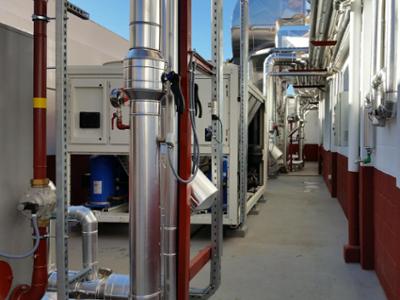

The role of facilities engineering in innovation and sustainable development

The role of facilities engineering in sustainable development and technological innovation is key in air conditioning and refrigeration projects. José María Zarzuela, vice-president of AEDICI (Spanish Association of Engineering and Facilities Consultants) and Julio Morá, president of ACI (Association of facilities Consultants), give us their points of view on this subject.
How important is facilities engineering in the air conditioning and refrigeration sector?
José María Zarzuela (AEDICI): Facilities engineering is a technical service contracted by the developer either directly or through the architectural team and develops partial projects for the building's facilities, including air conditioning and refrigeration. The engineering knowledge of the status of technology, independence from manufacturers, knowledge of current regulations and future trends regarding refrigerant gases, and the ability to compare different systems and choose the most suitable for each project make facilities engineering an essential part of air conditioning and refrigeration projects.
Julio Morá (ACI): Today, especially in Europe, energy efficiency is a top priority that requires the commitment of society as a whole. Facilities engineers design systems that optimise the use of resources, minimising energy consumption and reducing carbon emissions. This not only has environmental but also economic implications, as it allows companies and individuals to reduce their operating costs over the entire life cycle. In an environment of climate change, facilities engineering is key to ensuring sustainability. Our engineering companies, in addition to complying with local regulations and increasingly with more demanding international standards, must be at the forefront and be a driving force for change in the implementation of logical and efficient solutions.
How does facilities engineering contribute to promoting sustainable development and technological innovation in Spain?
Julio Morá: Facilities engineering ensures that systems can operate reliably under varying conditions, protecting both users and assets, and this affects people's health and well-being. Well-designed air conditioning systems improve indoor air quality, control temperature, humidity, and air renewal, ensuring a healthy environment in our buildings. Therefore, I believe that our contribution is essential to move towards a more efficient, sustainable and people-centred HVAC and refrigeration sector. As consultants, our mission is to lead this change, working closely with manufacturers, architects, developers and government bodies to deliver innovative and responsible solutions.
Facilities engineering continually demonstrates an unprecedented ability to adapt and improve. By facing permanent challenges with proactive strategies and innovative attitudes, the facilities engineering sector can continue to move forward and adapt to the challenges of the demanding yet ever-changing air conditioning and refrigeration environment.
José María Zarzuela: In air conditioning installation projects, the engineering department carries out simulations of energy consumption with different systems, as prescribed by the Regulation on Building Heating Installations (RITE, in Spanish). The results of the energy operating costs over the life cycle of the installation are combined with the installation costs of each system. In this way, installation cost is only one component of the total outlay, and energy consumption may have a greater weight than this in some types of installations with long periods of use.
On its website, in the documents section, AEDICI has published a study of energy simulations with different calculation tools (HAP, Energy Plus and HULC) of a building and its compliance as a "nearly zero energy building" nZEB. The study was carried out by ten AEDICI partner engineering companies and the final conclusion is that a thorough knowledge of the tools used and the concepts of simulation and HVAC systems is necessary to obtain reliable results.
How prestigious is the profession of facilities consultant today and how can this prestige be further enhanced?
José María Zarzuela: With honourable exceptions, facilities engineering is the great unknown in the world of construction, relegating us in many cases to a basic definition of the facilities that the installer ends up modifying according to their budget and ignoring operating costs. The reason for this is that in general there is no direct communication with the developer, our presence on site being largely token.
AEDICI is participating in a working group, together with other associations of facilities and structural engineering companies, which seeks recognition of our activity and direct contracting by the properties in order to be in direct contact with them and to participate in the decision-making process affecting the facilities, as well as in their construction management.
Julio Morá: ACI was created in 2008, as an initiative of Catalan consultancies with the aim of creating a joint representation tool. We have always believed that independent consultancy is one of the great intellectual assets of our country and we have earned our current prestige; our reputation as technology prescribers makes our service to society and to the construction sector work of strategic importance that is reinvented every day.
From the very beginning, ACI has focused on its mission of being a meeting place for consultants, as well as a platform for technical debate. It has done this by establishing itself up as a leading agent among other building agents, assuming the responsibility of defending the interests of the future of the collective and enhancing the prestige of all our professionals, watching over the ethics, rights and dignity of our profession, and expressing in a visible way the point of view of the associates.
We believe in teamwork and therefore we try to give a voice to other entities in the sector with which we have a close relationship. Evidence of the perfect status of relations between our associations is the latest edition of the National Congress of Facilities Engineering, held on 2 July in Barcelona. Associations such as Actecir, Ashrae, Aedici, ACE, ACFM, Asinca, AEDP, Cluster d'eficiencia de Catalunya, etc... played an important role either as moderator or as speakers in the different presentations and round tables that we had planned.
We are also working closely with AEDICI, ACE and ACIES in the establishment of a narrative that reflects on the importance of structural and installation consultancy in building, its current situation and the disadvantages we face in the day-to-day work of our engineering companies with the aim of highlighting the value of contracting partial projects, as well as the recognition and assumption of the highest responsibilities in the construction processes.




